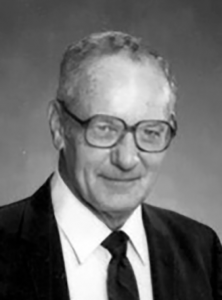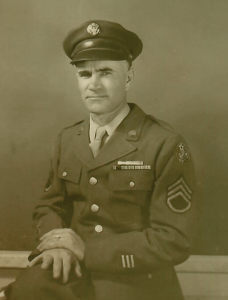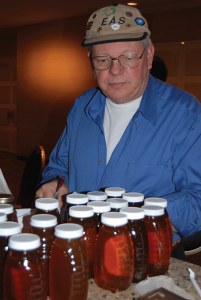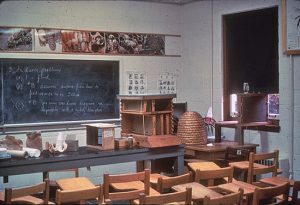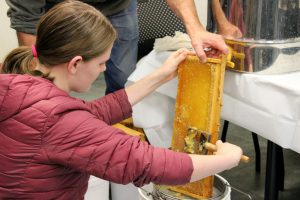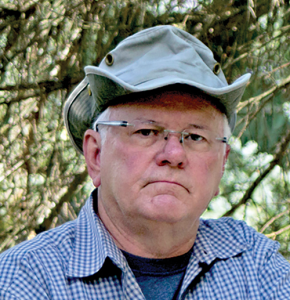
James E. Tew
Stay Connected
http://onetew.com
By James E. Tew
Some People Who Were At Pivotal Points On My Beekeeping Journey
It’s not about me – I promise
Editor Kim has told me that this annual issue in which selected beekeepers are interviewed is the most popular issue of the year. I’ve always found interviews to be a challenging topic for an article. Who to interview, what to say, how to say it, how to photograph the person, and most of all – how not to be boring. Having written that, all of the interview articles in previous BC editions have always been upbeat, positive, interesting and educational. (But that still doesn’t make it any easier for me.)
My contribution to this month’s topic is not about me, but I must be a player in this piece. I want to tell you about the various people who helped get me to this point in my beekeeping life. I certainly needed help. This year is my 45th beekeeping birthday. That’s a long time, but others have been involved in this craft much longer. I’m no record breaker.
For me to get this point, it took a series of junctures in life – decisions that I made without a road map of life. While my beekeeping passion was all mine, the people who happened to be at those junctures were unintentional guides who gave me directions and support but who rarely gave specific advice. They gave me foundational information. Most of them are no longer here.
My earliest contributors to my bee life
The very earliest contributors to my bee life were school teachers. Mrs. Harvel1, second grade, used an aquarium to show how a tadpole changed into a frog. Ultimately, the young frog grew legs and jumped out the schoolroom window. Mrs. Griffin, sixth grade, had my class sprout grains of corn in soil-filled cups that were kept in the dark “ink closet,” a closet where we actually stored our ink bottles2. The corn sprouted white – not green. When we later put the corn on the window sill, it turned green. This simple project clearly showed the actions of chlorophyll and photosynthesis. I was enthralled. Mrs. Crocket was my eighth grade science teacher. She was the first to begin to bring scientific concepts together. She introduced basic theories in geology, astronomy, and biology. In several ways, I’ve always felt that my life’s path began in this class. In high school Miss Smitherman taught me advanced biology and human biology – including human reproduction. Very enlightening and a class not to be forgotten.
I was not a particularly strong academic student, but I loved anything biology or science-related. When I left home to continue my education, I knew – clearly – that I wanted to major in Biology. While away at Troy University, I married a young woman from my eighth grade science class. She knew someone who knew someone who could help me get a job within the university. For $1.15 per hour for 15 hours per week, I became an aide assigned to the entomology instructor, Dr. Costes. I immediately took her introductory entomology class and began developing an interest in entomology. It was a thorough and demanding class. Working with insect collections, grading exams, and working as a lab instructor, Dr. Costes developed me into a competent basic entomologist. She was patient and supportive. Under her tutelage, I developed a strong bug love. Strangely, during this time, I had no special interest in honey bees.
Immediately after university graduation, I did some military time and upon my departure from active service, the G.I. Bill was available to me. In a very real way, this support program paved my road straight to beekeeping. I certainly didn’t know it at the time.
Using G.I. Bill funding, I went to graduate school at Auburn University in the Department of Entomology, expecting to become a pesticide specialist. At the time, that’s where the money was.
Dr. George H. Blake, Jr.
At Auburn, Dr. George Blake, Professor of Entomology became the gateway to my career. For reasons that many of you may know from a story that I have often told, I essentially accidentally signed up for his beekeeping class. It’s a bit of a story that is out of place here. At the time, bees had little to do with my chosen pesticide career. You see, I never intended to stay in this odd class.
Due to World War II, Dr. Blake’s earliest years at Auburn University (Then named the Alabama Polytechnic Institute, API) are cloudy – at least to me. University policies and programs were being changed due to the war. For instance, the university changed from the semester system to the quarter system to help male students graduate quicker before going into military service.
Blake trained at Fort Benning, Georgia as a forward artillery observer and then trained his own artillery battery. For his distinguished service in France and Germany during World War II, Blake was awarded several honors, including the Bronze Star and two Purple Hearts. I took two of Dr. Blake’s classes and spent hours in labs with him. Though Vietnam was raging at the time I was at Auburn, he never mentioned his own significant military contribution. In my presence, he never showed preference or exceptional interest to military veterans in his class. I suspect that most of his students learned of his war-time contribution from his obituary.
In late 1948, the year of my birth, Blake attended the University of Illinois where he received his doctorate in economic entomology before again returning to Auburn. George H. Blake Jr. died in 1997.
He was a powerful personality in the classroom and everywhere else, I suspect. He was loud, engaging, entertaining, and very educational. He was casual and academically confident. Those hundreds of us who took his classes continue to have a unique bond – a sense of unwarranted acclaim. We were one of Blake’s students.
Some distinct memories
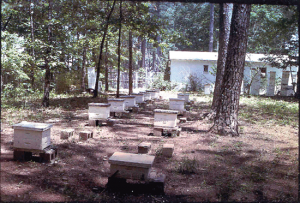
Dr. Blake’s out apiary building and beehives (1973). The huge forestry building with expansive parking lots is there now. All bee facility remnants are long demolished.
During my time with Dr. Blake, I acquired several long-term memories that I cherish. For instance, on the several occasions when the bee class installed packages, the good Doctor would select a student, instruct him or her on how to bounce the wooden cage, remove the queen cage and then, “pour the bees from the package like shelled corn.” You must know that every time, I have shaken bees from the packages of my lifetime, I remember that reference. Indeed, it is like pouring shelled corn from that screened cage.
The timeframe was the early 1970s. The first time I ever attended a bee class with the Doctor was ironically a lab session. He had put a carbide-tipped circular saw blade on the bee lab table saw to cut deeps down to deep shallows (6-5/8”). Noise, sawdust, sparks and occasional nails were flying about the lab area as he shouted, “these deeps have gotten too heavy for me so I’m cutting them down to a lighter box size.” Across the room sat a stack of 20 or 30 packages of bees.
The place was chaotic. Most of the students were traditional hippy types of the day. They sported bandanas, long braided hair, sandals and all were wanting natural honey to go with their unflavored yogurt and raw bean sprouts. I had a thought something like, “this is the craziest crowd I’ve ever been around.” Shortly thereafter, we installed the packages, and I never looked back. Indeed, that lab day was my life’s last day of normality. I no longer ran from bees, but rather I ran to bees. That’s just not normal.
A brief dead end with a thank you
I was passionate about beekeeping. I could not get enough. I have no idea what causes such devotion in people. At the end of the day – honey bees are simply insects. But not to bee people.
On a trip home and after experiencing my bee energy time and again, my Dad asked me a legitimate question. “Jimmy, how are you going to make a living with your hobby?” While his comment “stung,” I knew he was right. My wife was working to support us while I had only erratic part-time income. Where is this going? I needed a plan.
On a whim, I went to visit M.C. Berry of M.C. Berry and Sons bees. The Montgomery-based company produced packages and queens. Sitting across the heavy, dark desk from him in a paneled room with the requisite bee and hive things sitting here and there, I told Mr. Berry I wanted to work for him. I explained my passion for bees and that I needed to begin to generate income. At the time, my only background was a partial bee class at Auburn.
Mr. Berry, a man whose face I cannot even recall, told me to finish the bee class and complete my Master’s degree. Then come back to him and we would talk. When I left that day, that was my intent. You probably know I never went back.
I will always appreciate whatever Mr. Berry saw in me that day that caused him to politely send me away. Maybe it was a good vision or maybe it was a bad one. Either way, he steered me into a life that was better suited for me. I never thanked him for that experience. In fact, I never saw him again. The company no longer exists.
Uncle Auby
My Dad was part of a large depression era family. Of the many uncles and aunts that I had, Uncle Auby stood out. While serving in the U.S. Army Air Corps in WWII in India, Uncle Auby contracted polio. The VA trained him to be a watch and clock repairman. To this day, I have a jewelers lathe and a few of his other repair tools. At the time, he lived in Micanopy, Florida. I don’t know how or why but he had bees there. As you would expect, he was “kinda” nutty about them.
While I was an irrational bee student at Auburn, at a family event, I mentioned to my Uncle that I was ready for some bees of my own. My memory fogs until I can recall two beehives in the open trunk of a Rambler Americanw at my childhood home in south Alabama. The two hives were off loaded at our family farm and put in one of the worst locations on the farm. To access the colonies – once we got them there – required crossing a six foot deep ditch with a steep side and fence line at the top. It was a terrible location. I have no recall of why I selected it. None the less, thanks to Uncle Auby, I had my own two hives of bees. All these years later, I still have a few pieces of my original hive equipment.
A distinct memory Uncle Auby gave me
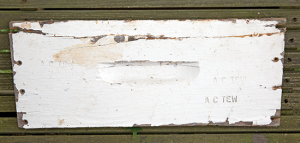
A 45-year-old super end from one of my first beehives. Note my uncle’s frame brand used to brand the super.
Due to his watch and clock repair training, my Uncle was a crazy man for precision. He flatly stated that the eyelet holes in the end bars of frames were not centered enough. When I worked with him, he required me to use a tri-square, lay out a dead straight line and re-drill the eyelet holes. This task drove me crazy. At the time, the eyelets were made of brass not aluminum as they are now (for those precious few of you beekeepers who still wire your frames). He also required gluing and nailing the frame every way possible. I do wish I still had one of his indestructible frames. Alas . . .
Dr. Dewey Caron
As I was finishing my degree work at Auburn, no one was surprised that I would want to pursue the next degree. I asked Dr. Blake to take me as a student. He turned me down. He said he was in the last stages of his career and that he had long ago stopped taking students. Another professor at Auburn, Dr. Mike Williams, ironically, was on the faculty at the University of Maryland before returning to Auburn. He knew the bee professor at Maryland and thought I would fit in there. Upon his advice, I contacted Dr. Dewey Caron at the University of Maryland.
- Dr. Dewey Caron, NJ Beekeepers Association Annual Honey Show, February 12. Curtis Crowell photo
- A partial view of Dr. Caron’s classroom at the University of Maryland, 1975.
Dr. Caron accepted me as one of his students. I entered the program in the Entomology Department at Maryland and was trained in all academic aspects by my mentor. He taught me beekeeping, he taught me to present structured lectures and discussions, he taught me how to creatively develop training programs and short courses, and how to organize classes. Dr. Caron is the professor and teacher who took me to the final stage of my journey.
I must readily say that my training program with Dr. Caron is not over. We are now both – mostly – retired, but my mentor simply will not quit. Even in deep retirement, Dr. Caron continues to develop impressive written material and to present current and authoritative lectures. It feels more than a bit wrong for me to quit while my mentor is still working essentially full time and working very productively. On my life’s bee path, I owe Dr. Caron a lot.
This is risky
I have taken a great risk in listing people who have been influential. Where is the line. People such as Laurence Cutts, former state apiarist, Florida and commercial beekeeper were instrumental in my beekeeping career. So many good people to squeeze into 2000 words here. I appreciate all of them.
You, too
Each of you who have read to this point have similar people in your life who helped you on your individual way. They may have only been doing their job, but they helped build your road to beekeeping.
Thanks to all the people in my life who helped me get to this point in my beekeeping journey. Each of these people have meant a lot to me.
1I am using the title designations for my teachers as they were at the time. That was their name to me during those years.
2It’s true. We actually wrote with refillable fountain pens.
3To my Alabama readers, no need to phone the bee police. When my Uncle brought bee hives to me, we had no idea that Alabama had a “no comb entry” regulation. It’s still in effect today. Mr. Guy Carr, Alabama State Apiarist at the time, inspected and approved the colonies. He suggested that I acknowledge the regulation from henceforth. I have done that.
Dr. James E. Tew, State Specialist, Beekeeping, The Alabama Cooperative Extension System, Auburn University, Emeritus Faculty, Entomology, The Ohio State University; Tewbee2@gmail.com; http://www.onetew.com







